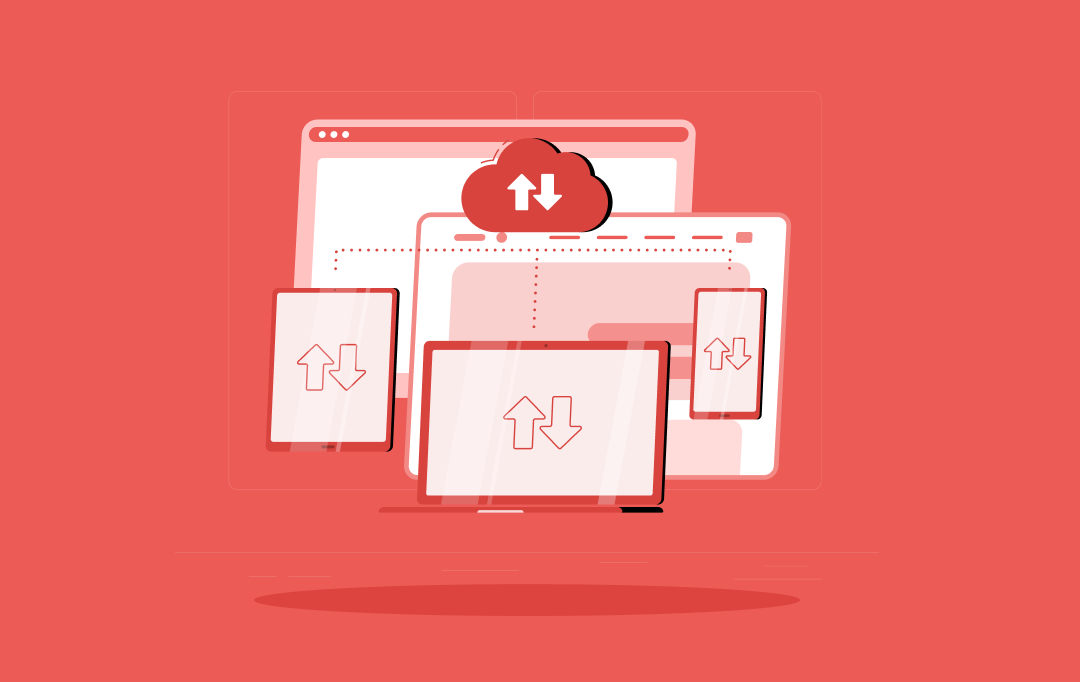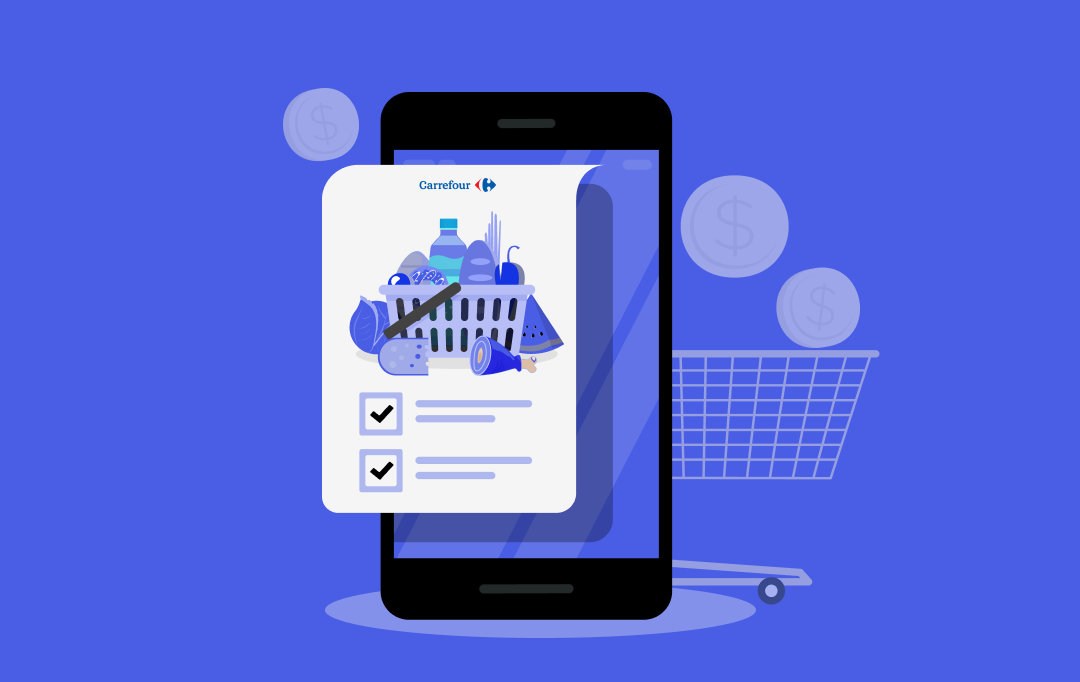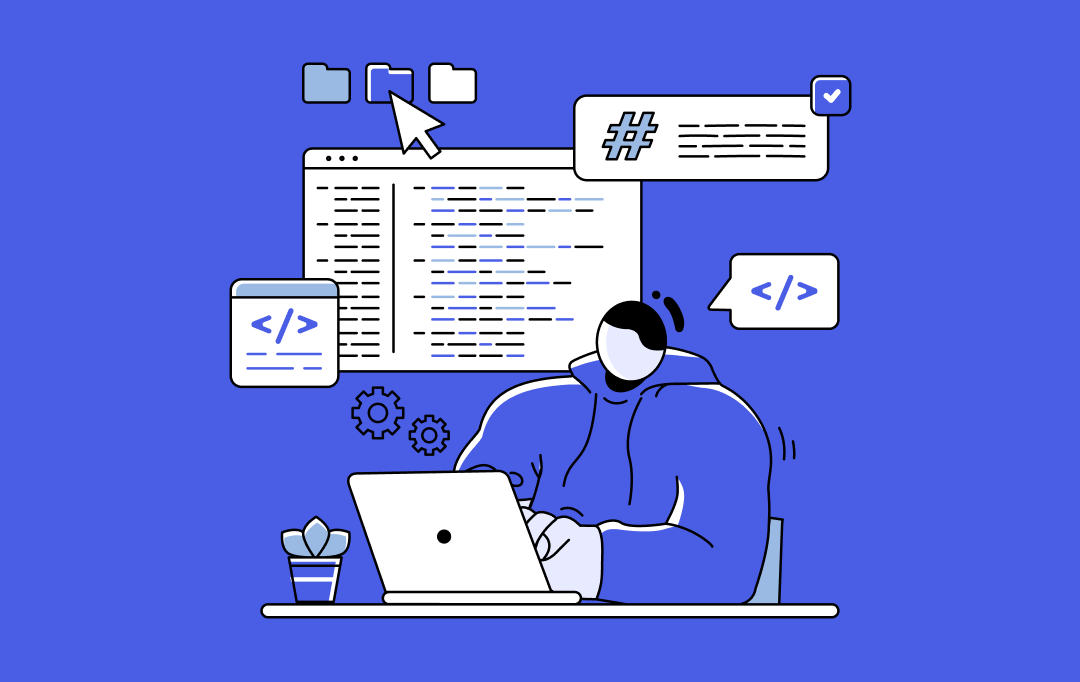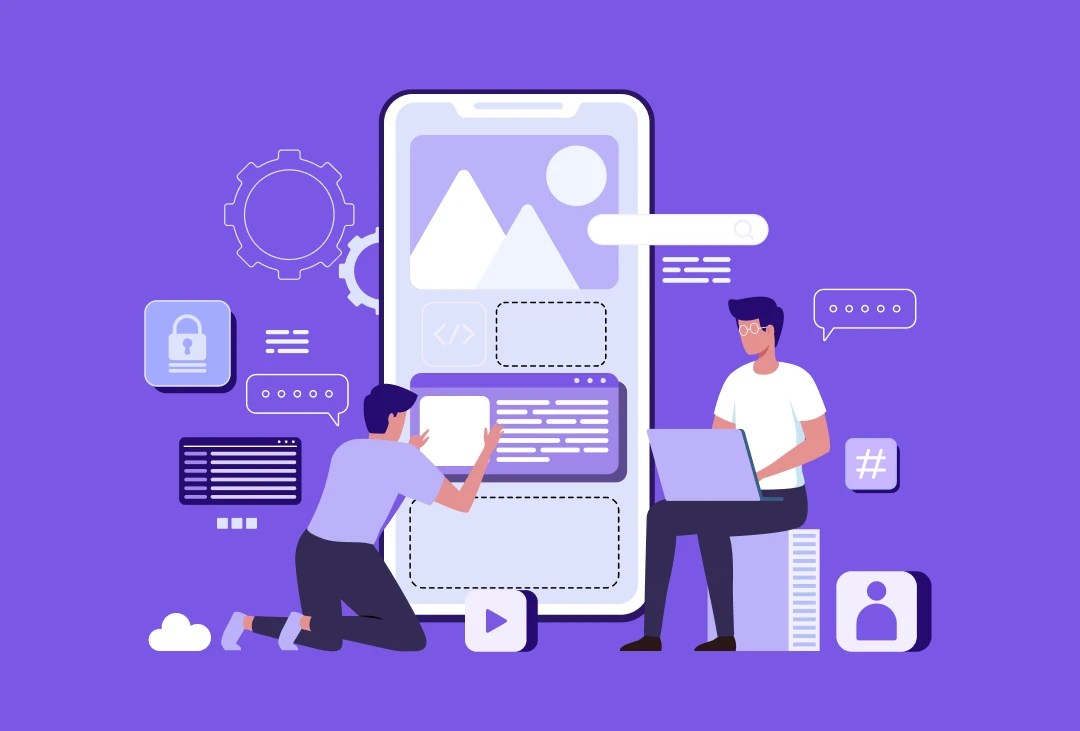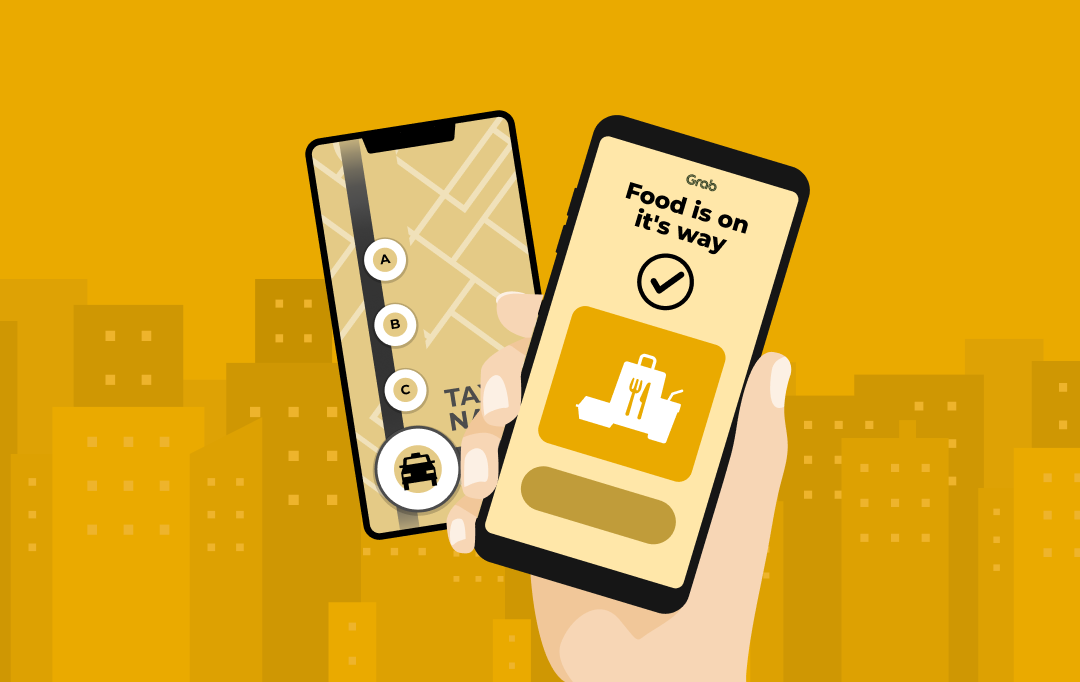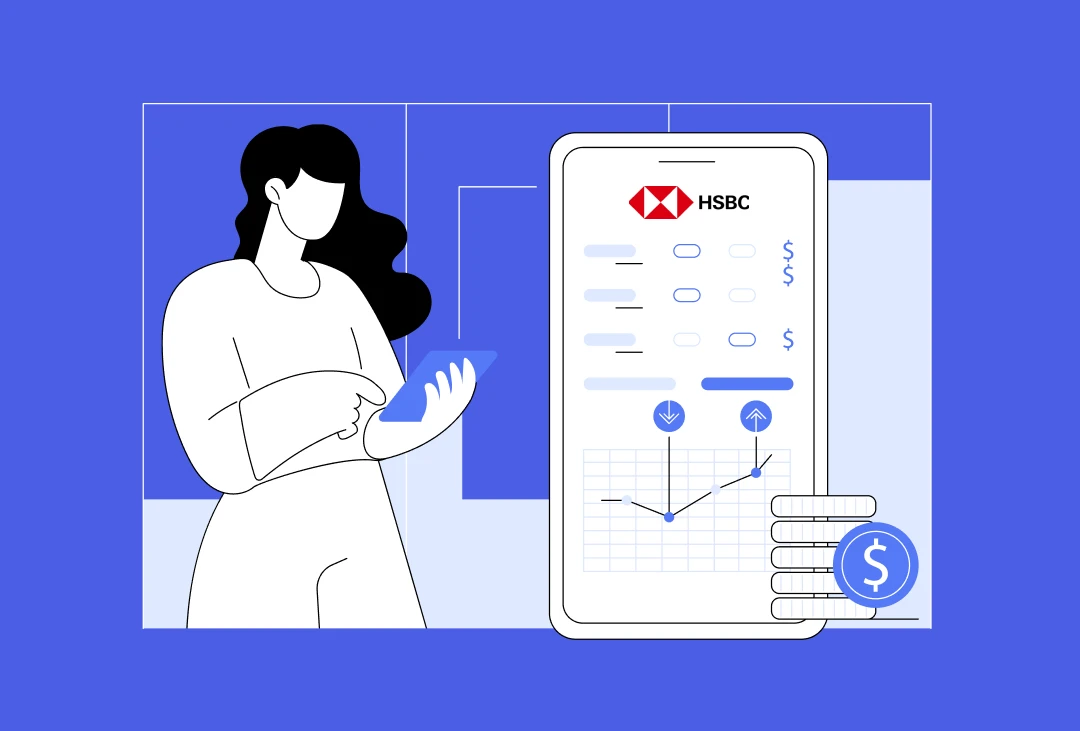Saudi Arabia’s Vision 2030 is driving a nationwide digital transformation, positioning the Kingdom as a global leader in technology and innovation. A key part of this vision is modernizing government services, making them more accessible and efficient through digital shift.
This digital shift enhances public services and redefines how businesses and employees interact with government entities. It aims to simplify administrative processes, improve efficiency, and foster a more dynamic labor market. One such initiative leading this transformation is Qiwa KSA.
Qiwa KSA, launched by the Ministry of Human Resources and Social Development, is setting a prime example for this effort by streamlining labor market processes such as employment contracts, visa services, and workforce management.
The app embodies the Kingdom’s push for a fully digitized, business-friendly environment.
For businesses operating in or engaging with Saudi Arabia, an app similar to Qiwa is more than a convenience. It’s an essential tool that aligns with the nation’s regulatory framework and labor laws. But what if you wanted to develop a similar platform? What would it take in terms of cost, infrastructure, and resources?
Building an app of this scale requires a deep understanding of compliance requirements, robust security protocols, and a scalable architecture. In this article, we’ll break down the key factors affecting the cost of developing an app like Qiwa, which tends to fall in the spectrum of SAR 135,000 to SAR 2,500,000, helping businesses gauge the investment required to make an app like Qiwa in Saudi Arabia.
Cost to Build an App Like Qiwa KSA
When you build an app like Qiwa KSA, it isn’t just about coding a platform – it requires a strategic investment in technology, security, and compliance. So, the Qiwa-like mobile app development cost would also depend on the app’s complexity, integrations, and scalability needs.
Simple Level: SAR 135,000 to SAR 400,000 ($36,000 to $1,06,645)
For a simple version, the Qiwa mobile app development cost typically ranges between SAR 150,000 and SAR 400,000. This includes the basic functionalities needed to launch a minimal viable product, allowing businesses to test the market before committing to a full-scale solution. It’s ideal for startups or those seeking a lightweight digital solution without extensive automation or integrations.
Medium Level: SAR 400,000 to SAR 900,000 ($1,06,645 to $2,39,953)
A medium-complexity Qiwa application development cost can be between SAR 400,000 and SAR 900,000. This range covers a more polished user experience, additional administrative controls, smart automation, and improved scalability. Businesses needing a more robust but cost-effective platform often opt for this level.
Advanced Level: SAR 2,500,000+ ($666,536+)
For enterprises requiring a highly advanced, government-compliant, and AI-driven system, the cost to build an app like Qiwa can exceed SAR 2,500,000. This covers complex security measures, blockchain-powered contract verification, large-scale integrations with multiple government and private entities, and cloud-based scalability. This solution is usually best suited for organizations managing vast workforce data or planning national-level rollouts.
Hidden Costs You Should Consider
Beyond development, there are several hidden Qiwa like app development cost that often go unnoticed but can significantly impact your budget:
- Regulatory Compliance: Since Qiwa operates under Saudi labor laws, your app must comply with data protection, cybersecurity, and employment regulations, which may require legal consultations and certifications.
- Cloud Infrastructure: Hosting a large-scale platform demands a reliable cloud provider. AWS, Azure, or Google Cloud services have recurring costs for server uptime, storage, and security management.
- Maintenance & Updates: Apps of this nature require continuous updates for bug fixes, feature enhancements, and compliance with changing regulations. Post-launch app maintenance can add 15-25% of the initial development cost annually.
- Third-Party Integrations: Services like Absher authentication, payment gateways, and government APIs often have additional licensing or per-transaction fees.
- Cybersecurity Investments: As a workforce management system, the app will handle sensitive employee and business data, requiring regular security audits, penetration testing, and encryption measures.
Understanding these demarcations of Qiwa mobile app development cost upfront would help businesses budget realistically and avoid surprises. However, along with the complexity-wise cost ranges, it is equally important to understand the critical factors affecting the cost of developing an app like Qiwa (features, design, and tech stack), explained in detail below.
List of Must-have Qiwa App Features
When you make an app like Qiwa KSA, the process necessitates a comprehensive suite of features tailored to meet the needs of both employers and employees while also providing essential tools and support services. Below is an organized breakdown of the Qiwa app features that we believe would help you launch a product similar to the revolutionary offering.
For Employers:
- Business Registration: Facilitate the seamless registration of new businesses, allowing entrepreneurs to complete all necessary steps online without needing physical visits to government offices.
- Access to Government Services: Provide a centralized platform where businesses can easily access various government services, including obtaining necessary permits and documentation.
- Financial Services Access: Offer avenues for businesses to explore funding opportunities, such as loans and financial support programs, to aid in business expansion and development.
- Employee Management: Enable employers to manage their workforce efficiently, including hiring, contract management, work permit issuance and renewal, and employee transfers between companies.
- Training and Development Programs: Provide access to training resources to help businesses enhance the skills of their workforce, contributing to overall business growth and employee satisfaction.
For Employees:
- Employment Status Verification: Allow employees to verify their employment status and access their records securely.
- Work Permit Management: Facilitate issuing and renewing work permits, ensuring employees can efficiently manage their legal work status.
- Career Management: Provide tools for employees to manage their career progression, including access to training programs and opportunities for skill development.
Tools and Calculators:
- Nitaqat Calculator: Assist businesses in calculating their Saudization (Nitaqat) status to ensure compliance with national employment policies.
- End-of-Service Reward Calculator: Provide a tool to calculate end-of-service benefits, helping employers and employees understand financial obligations and entitlements.
- Certificate Validation: Offer a feature to validate professional and educational certificates, ensuring the authenticity of employee qualifications.
- Work Permit Calculator: Assist in calculating fees and requirements for work permit issuance and renewal.
Additional Support Services:
- Virtual Assistant: Implement an AI-driven virtual assistant to guide users through the platform, answer common queries, and provide support for various services.
- Compliance Management: Ensure the platform helps businesses adhere to local labor laws and regulations by providing up-to-date information and compliance tools.
- Performance Evaluation: Offer tools for businesses to evaluate establishment performance, aiding in strategic decision-making and operational improvements.
Incorporating these features will create a robust platform that streamlines labor market processes, enhances user experience, and aligns with Saudi Arabia’s regulatory framework. However, ensuring that it does and the returns on your cost to build an app like Qiwa are guaranteed will need other factors addressed, such as design, tech stack, and partnering with the best mobile app development company in Saudi Arabia.
Design Factors to Consider When You Build an App Like Qiwa
Creating a platform like Qiwa KSA isn’t just about functionality; it’s about delivering a seamless, intuitive experience that keeps users engaged. Given that the platform serves employers and employees, its design must ensure that users can access government services without confusion or unnecessary complexity.
A well-thought-out UI/UX strategy can distinguish between an efficient and frustrating digital service. Let’s explore the key factors contributing to a well-designed app similar to Qiwa.
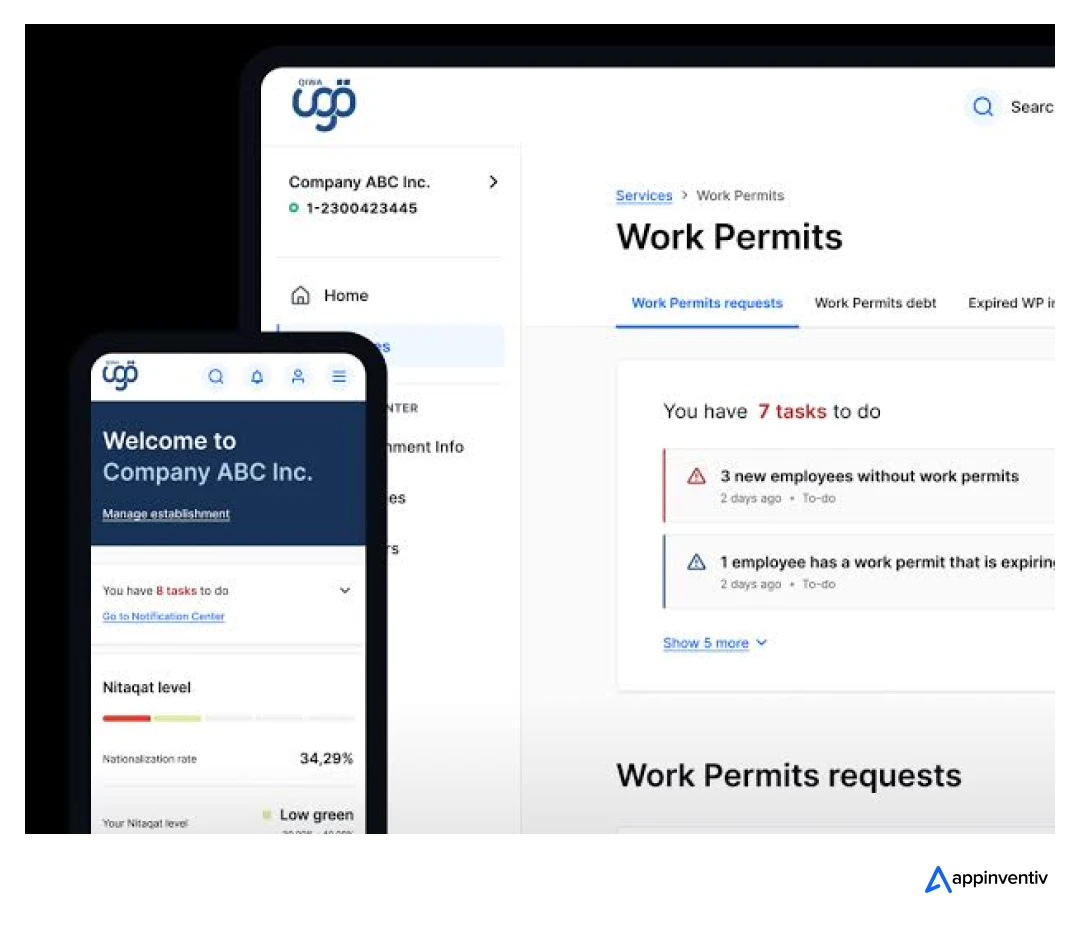
1. Simplicity & Clarity
Government service platforms often have complex processes and vast information, making it easy for users to feel overwhelmed. A clear, structured interface helps users find their needs without unnecessary clicks or delays. The design should prioritize a minimalist approach, where important services like business registration, work permit renewals, and labor contract documentation are placed front and center.
Using color coding, consistent typography, and well-defined icons ensures users can instantly differentiate between employer and employee services. Every label, button, and action should be self-explanatory, reducing dependency on customer support and making the user experience effortless from the first interaction.
2. Localization & Bilingual Support
Since Qiwa serves a diverse user base in Saudi Arabia, supporting Arabic and English is essential. The platform must go beyond simple translation – Arabic right-to-left text alignment should be properly implemented to ensure a smooth reading experience for native users.
Additionally, culturally relevant date formats, terminology, and iconography should be carefully considered. A well-localized UI improves user trust and comfort, making it easier for Saudi nationals and expatriates to access critical workforce services without language barriers.
3. Intuitive Navigation
A government service app should not require users to search endlessly for key functions. Instead, it should offer a dashboard-first approach, where users can view relevant information at a glance – such as pending work permit approvals, employee transfer requests, and contract renewals.
Simple, well-structured menus ensure that users do not feel lost while navigating through different sections; moreover, search and filtering options can allow users to find specific services instantly. Features like quick-action shortcuts for frequently used services can further enhance usability, ensuring users can complete essential tasks without multiple steps or unnecessary delays.
4. Mobile-First, But Seamless Across Devices
With smartphone penetration in Saudi Arabia exceeding 98%, mobile-friendliness is non-negotiable. The app should be designed for effortless navigation on small screens, ensuring that users can complete tasks without zooming, scrolling excessively, or dealing with unresponsive buttons. However, the desktop experience is just as important, especially for employers managing multiple employees.
A fully responsive design allows for a seamless transition between devices, ensuring users have a consistent and optimized experience on a phone, tablet, or desktop. When creating a platform like Qiwa KSA, the goal is to make the web version feel as intuitive as the mobile app, preventing usability gaps between different platforms.
5. Smart Automation & Guided Workflows
Many users of Qiwa Saudi Arabia-like platforms are not tech-savvy, so the app should eliminate manual complexities wherever possible. Step-by-step guided workflows can simplify government-related processes such as employee transfers, contract signings, and business registration.
Auto-fill capabilities, document upload integrations, and real-time error validation can prevent mistakes that might lead to rejections or delays. Additionally, AI-driven chatbots for ERPs can provide real-time assistance, helping users navigate processes and troubleshoot issues without contacting support. The more streamlined the workflows, the more efficient and user-friendly the platform becomes.
6. Security-Driven UI
Because the platform handles sensitive business and employee data, security must be built directly into the user experience. Security features should be visible but not intrusive, such as integrating biometric authentication (Face ID, fingerprint login) for easy but secure access.
Implementing multi-factor authentication adds an extra layer of protection for transactions involving business registration, contract approvals, or visa applications. Additionally, security indicators like real-time login alerts, encrypted document uploads, and user activity logs assure users that their data is handled safely. A secure yet frictionless experience ensures trust while keeping government interactions smooth.
7. Interactive & Assistive Features
A great digital platform should be more than just functional – engaging and proactive. Real-time status updates, push notifications for pending approvals, and automated reminders for expiring work permits ensure users never miss important deadlines. Dark mode options, adjustable text sizes, and voice command support improve accessibility for a diverse user base.
Additionally, an AI-powered virtual assistant can guide users through processes, answer queries instantly, and provide recommendations based on past activities. By incorporating these interactive elements, your Qiwa Saudi Arabia app version becomes a dynamic and responsive digital assistant rather than just a static service portal.
An app similar to Qiwa will be more than just a government services platform – it will be a bridge between businesses, employees, and regulatory frameworks. A well-designed UI/UX strategy, although playing a massive role in the cost to build an app like Qiwa KSA, ensures that users, whether employers or employees, can complete their tasks quickly, efficiently, and without frustration. By prioritizing simplicity, accessibility, automation, and security, the platform can drive higher engagement and user satisfaction, ultimately aligning with Saudi Arabia’s Vision 2030 digital transformation goals.
Now that we have looked into the user experience part of an app similar to Qiwa Saudi Arabia, let us look into another critical aspect of Qiwa, like app development cost – the Technology Stack.
Tech Stack Powering Saudi Arabia Government App Development
Qiwa like app development in Saudi Arabia requires a carefully selected tech stack that ensures scalability, security, and a seamless user experience across web and mobile. Given the platform’s role in government-business interactions, the technology choices should prioritize speed, reliability, data security, and compliance with Saudi regulations.
Below is a breakdown of the essential technologies and mobile app development frameworks needed to build a similar platform.
Frontend
-
Web App:
- React.js (Fast rendering, component-based structure)
- Vue.js (Lightweight and flexible alternative)
- Next.js (For server-side rendering and better SEO)
-
Mobile App:
-
UI Frameworks & Tools:
- Bootstrap / Tailwind CSS (For a modern and responsive design)
- Figma / Adobe XD (For UI/UX prototyping and design collaboration)
Backend
-
Programming Languages:
- Node.js with Express.js (Highly scalable and event-driven)
- Django (Python) (Robust security features, great for regulatory platforms)
- Spring Boot (Java) (Enterprise-grade solution with high security)
-
Databases:
- PostgreSQL (Structured data, reliable for government-related transactions)
- MongoDB (Flexible, NoSQL option for dynamic content and logs)
- Redis (For session management and caching to improve performance)
-
Authentication & Security:
- OAuth 2.0 / OpenID Connect (For secure user authentication)
- JWT (JSON Web Tokens) (For secure API communication)
- Biometric Authentication API (For fingerprint/Face ID login)
Cloud & Infrastructure
-
Cloud Platforms:
- AWS (Amazon Web Services) (Scalable cloud services, high availability)
- Microsoft Azure (Strong compliance features, ideal for enterprise applications)
- Google Cloud Platform (GCP) (AI & analytics integrations)
-
Server & Deployment:
- Docker & Kubernetes (For containerized deployment and scaling)
- NGINX / Apache (For web server and load balancing)
-
Storage & Document Management:
- Amazon S3 / Azure Blob Storage (For storing official documents securely)
- Blockchain Integration (For tamper-proof document verification)
Integrations & APIs
-
Government API Integrations (For KSA Market):
- Absher API (For identity verification & visa status)
- Muqeem API (For expat workforce data & residency info)
- HRSD API (For labor contracts & employer-employee transactions)
-
Third-Party Services:
- Twilio / Vonage (For SMS & WhatsApp notifications)
- Google Maps API (For location-based employer verification)
- AI Chatbot API (Dialogflow / IBM Watson) (For automated customer support)
Analytics & AI Capabilities
-
Business Intelligence & Analytics:
- Google Analytics / Firebase (For tracking user engagement)
- Power BI / Tableau (For real-time workforce data insights)
- Elasticsearch (For fast data retrieval & search functionality)
-
AI & Automation:
- TensorFlow / PyTorch (For predictive analytics & AI-powered automation)
- ChatGPT / GPT-based Assistants (For virtual support & HR-related inquiries)
Payment & Financial Transactions
- Mada (Saudi Payments) (For local bank transactions)
- STC Pay / HyperPay (For mobile-based payments)
- Stripe / PayTabs (For international payment processing)
Choosing the Right Tech Stack
The ideal tech stack for your mobile app depends on the platform’s scale, security needs, and budget. A small-scale MVP might use Node.js, React, and Firebase, while a large enterprise-grade solution might require Java with Spring Boot, PostgreSQL, and AWS cloud services. The choice of cloud providers, security frameworks, and APIs must also align with Saudi Arabia’s compliance standards for digital services while being in sync with the investments you wish to make for Qiwa like app development cost.
By selecting a scalable, secure, and well-integrated technology stack, businesses can make an app like Qiwa KSA that is future-proof, efficient, and aligned with Vision 2030’s digital transformation goals.
Best Practices to Optimize App Development Costs
Building an app like Qiwa requires careful budget planning to ensure cost efficiency without compromising on quality. Whether you’re a startup or an enterprise, managing development costs strategically can help you maximize your ROI while delivering a high-performing solution. Below are some best practices to keep your budget in check:
Develop a Minimum Viable Product
Instead of launching a fully-featured app immediately, start with an MVP, a version with essential features that allow you to test market demand. This helps reduce initial costs and gather real-world feedback before scaling.
Prioritize Core Features
Focusing on must-have features rather than including every possible functionality from the start prevents unnecessary expenses. Identify the key services your target users need and gradually expand based on user feedback.
Leverage Open-Source Technologies
Using open-source frameworks and libraries can significantly cut development costs while maintaining quality. For example, using pre-built authentication modules or payment gateways instead of developing them from scratch saves time and money.
Hire a Dedicated Development Team
A dedicated team model offers cost savings compared to hiring an in-house team or multiple freelancers. Working with an experienced app development company ensures efficient resource allocation, better coordination, and streamlined project execution.
Choose Cross-Platform Development
Instead of developing separate apps for iOS and Android, using frameworks like Flutter or React Native allows for cross-platform development. This reduces the need for two codebases, cutting development and maintenance costs.
Follow Agile Development Practices
Agile methodologies enable iterative development, ensuring the project adapts to changing requirements efficiently. This avoids unnecessary rework, making the process more cost-effective.
Use Cloud-Based Infrastructure
Hosting on cloud services like AWS or Microsoft Azure minimizes infrastructure costs. A cloud-based architecture also provides scalability, so you only pay for the resources you use.
Automate Testing and Deployment
Implementing automated testing helps catch bugs early, reducing the cost of fixing issues later. Additionally, continuous integration and deployment (CI/CD) streamline updates and maintenance, keeping costs low in the long run.
Optimize UI/UX Design from the Start
Investing in a well-researched UX design ensures users can navigate the app effortlessly, reducing redesign costs after launch. Conducting usability testing early prevents expensive modifications later.
Implementing these strategies allows you to build a cost-effective and scalable app while ensuring high quality and seamless performance. But, as entrepreneurs, knowing how you will make money from a product you have invested so heavily in is equally important. Let’s take that up in the next section.
Strategies to Monetize an App Like Qiwa in Saudi Arabia
A common question comes to mind while convincing yourself to build an app like Qiwa: How much money can you earn through an app like Qiwa?
Building an app similar to Qiwa presents numerous monetization opportunities, especially in a market where businesses and employees rely on digital solutions for government and HR-related services. Below are key strategies to generate revenue while ensuring a seamless user experience.
Subscription-Based Model
Offering tiered subscription plans can be a steady revenue source. Employers could pay for premium services like advanced workforce analytics, compliance tracking, and priority support, while employees might subscribe to career development tools or premium job-matching features.
Freemium Model
A freemium approach allows users to access essential services for free while unlocking premium features through paid upgrades. For example, basic employment verification and contract documentation could be free, while advanced HR analytics, AI-powered job matching, or priority visa processing could be part of a paid plan.
In-App Advertisements
The app can generate revenue through targeted ads by partnering with relevant businesses – such as HR consultancies, legal firms, and training institutions. However, to maintain user experience, ads should be non-intrusive and placed strategically within relevant sections of the app.
Commission on Job Listings & Hiring
Since the app serves employers and employees, a commission-based model for job postings can be a lucrative option. Employers could pay a listing fee or a success-based commission for every hire made through the platform.
Lead Generation for HR & Legal Services
Many businesses require legal support for employment contracts, visa processing, and labor law compliance. The app can act as a lead-generation platform by referring users to HR consultants and legal firms, charging a commission for each successful lead.
API Access & Data Monetization
API access to third-party businesses, such as recruitment firms, financial institutions, and government agencies, can open additional revenue streams. Securely anonymized labor market insights can also be monetized for workforce planning and economic analysis.
Pay-Per-Service Model
Instead of a subscription, users can be charged a one-time fee for specific services, such as expedited work permit processing, digital contract verification, or visa extensions. This model ensures flexibility for users while generating consistent revenue.
Corporate Partnerships & Sponsorships
Government-backed initiatives and large corporations often seek platforms that align with Vision 2030’s goals. The app can secure sponsorships or exclusive service agreements by partnering with key organizations, boosting credibility and financial stability.
E-Learning & Certification Programs
Given the increasing focus on skill development and workforce training, the app can integrate online courses, certification programs, and skill assessments. Employers and employees can pay for premium training content, upskilling the workforce while generating revenue.
With a combination of these strategies, your version of the Qiwa app will be able to maximize its monetization potential while providing real value to businesses, employees, and the Saudi economy.
How to Gain a Competitive Edge Over Qiwa?
While Qiwa has established itself as a go-to app for labor-related services in Saudi Arabia, there is still room for new players to carve out their niche by offering additional value.
In a constantly evolving market, replicating Qiwa’s features won’t be enough to attract users. To successfully compete, you must focus on understanding your target audience’s needs, addressing gaps within the current system, and offering innovative solutions that make the user experience smoother and more efficient.
Below are some strategies to differentiate your version of the Qiwa app and increase its adoption rate.
Offer Enhanced User Experience
- Intuitive Interface: Many government portals, including Qiwa, can be cumbersome to navigate. Create a clean, user-friendly design that simplifies complex processes, making it easier for employers and employees to complete tasks quickly.
Also Read: Tips to Enhance Mobile App Design by Improving UI
- Customization Options: Allow users to customize their dashboards and prioritize the tools and features they use most frequently. Personalized experiences can significantly increase engagement.
Focus on Advanced Automation
- Task Automation: Automate repetitive tasks like document submissions, notifications, and visa renewals to save users time. Qiwa still requires manual intervention in some processes, but offering seamless automation can give your app a major edge.
- Predictive Analytics: Leverage AI to predict visa or permit expiry dates, send reminders in advance, or even automate document submissions when deadlines approach.
Specialized Features for Small Businesses
- Business-Specific Tools: Qiwa primarily serves small and large businesses, but small businesses may find its functionalities overwhelming. Tailor your app to reduce app development costs for startups and small businesses, such as easy access to business funding, simplified HR functions, or tools to track employee training and development.
- Employee Management Tools: Include features that help small businesses manage their workforce efficiently, such as integrated payroll systems, time tracking, or performance management. This can attract startups looking for all-in-one solutions.
Seamless Integration with Other Platforms
- Third-Party Integration: Qiwa mainly focuses on government services. Your app could integrate with tools like HR software, payroll, or CRM systems to create a comprehensive business solution.
- Cross-Platform Access: Provide an integrated multi-platform experience, ensuring users can easily switch between the web, mobile app, and desktop versions.
Expand Government Service Access
While Qiwa focuses on specific areas like labor contract documentation and employment status verification, your app could integrate additional government services. For instance, incorporate services from the Ministry of Health, Ministry of Education, or even municipal services, expanding the range of governmental interactions users can complete through your app.
Provide Real-Time Support
Qiwa offers basic customer support, but you could stand out by providing 24/7 live chat or in-app assistance from experts who can help users through complex processes in real-time. Additionally, having a virtual assistant that provides instant answers to FAQs or troubleshooting can increase user satisfaction.
Incorporate User Feedback for Continuous Improvement
- User-Driven Updates: Engage users through surveys and feedback loops to continuously evolve your app based on their needs. Offer them a platform where they can suggest features and, if feasible, integrate those suggestions into your app.
- Community Engagement: Develop a community around your app (e.g., a dedicated forum or social media group) where users can discuss labor laws regulatory changes, or even share tips about the platform. This creates a sense of belonging and trust, which could set your app apart.
Flexibility in Pricing and Subscription Models
Many users may avoid Qiwa KSA due to the potential costs of accessing premium features. Offer flexible pricing tiers based on the business size or usage frequency, or provide a freemium model where basic services are free, and users can pay for premium features.
Speed and Efficiency
Ensure your app is faster and more responsive than Qiwa KSA. Users tend to abandon apps that take too long to load or process requests. Offer speedier access to key services like employment status verification, visa issuance, and end-of-service reward calculations.
Enhanced Security & Data Privacy
- Stronger Security Features: Security is critical for users handling sensitive data. While Qiwa has adequate security, you can add a layer of transparency regarding how user data is dealt with and ensure your app has end-to-end encryption, two-factor authentication, and data anonymization options to guarantee user privacy.
- Regulatory Compliance: Make it clear that your app complies with Saudi Arabian data protection laws and global standards. This can make users feel more secure and trust your platform over others.
Localized Features for Different Regions
Focus on offering localized features for businesses and employees in different cities or regions within Saudi Arabia. For example, providing services in multiple languages, offering support tailored to expats, or adapting to local cultural norms can broaden your app’s appeal.
Collaborative Partnerships
When you build an app like Qiwa, it could also help you collaborate with local businesses, HR consultancies, or even government entities to build brand credibility and offer exclusive perks to users, such as discounts or special promotions when using your platform for their regulatory tasks.
By focusing on these areas, your app will offer services that Qiwa already provides and go beyond to solve additional problems and delight users, ultimately getting you a high monetary and intrinsic ROI on this Qiwa mobile app development process.
However, achieving this while guaranteeing robust, scalable, and secure development would call for a partnership with a team specializing in Saudi Arabia government app development. Someone like Appinventiv.
Appinventiv Saudi Arabia: The Right Partner for Building Your Government-Focused App
When building an app that interacts with government services, having a partner with deep expertise in the local ecosystem is essential. At Appinventiv Saudi Arabia, we understand the unique challenges and opportunities of creating government-focused applications, especially in Saudi Arabia.
- Being a bespoke Mobile app development company in Saudi Arabia, our in-depth knowledge of local government regulations and public service processes makes us well-equipped to develop apps tailored to meet user needs and compliance standards.
- Our team has extensive experience in handling government projects and knows how to build a result-driven app that aligns with Vision 2030’s goal of digital transformation – all the while ensuring that you get maximum returns on the cost to build an app like Qiwa.
- What sets us apart is our focus on building scalable, secure, and user-friendly platforms that simplify the complex systems often associated with government services. Whether you want to develop an app like Qiwa or are looking to innovate further, we take the time to understand your vision and work closely with you to create a functional but also intuitive and efficient solution.
- Our expertise in navigating the local regulatory landscape ensures that your app will comply with Saudi laws, while our focus on design and performance guarantees a seamless user experience.
- Honored with the title of ‘Tech Company of the Year’ at the Times Business Awards 2023, Appinventiv is a trusted leader in delivering top-tier mobile app solutions.
- We are known for our reliability and consistently delivering projects on time and within budget across various industries. Our extensive portfolio and positive client feedback underscore our ability to add significant value.
Partnering with Appinventiv means having a team that is as invested in your success as you are. Our commitment to delivering high-quality, secure applications ensures that businesses, employees, and government entities will benefit from your platform. If you’re looking to create an app that provides real value to users and supports Saudi Arabia’s digital growth, we can be the ideal partner to bring your project to life.
FAQs
Q. How do you develop an app like Qiwa in Saudi Arabia?
A. Qiwa app development process involves a series of key steps, starting with understanding the core requirements of both businesses and employees. First, you’ll need to thoroughly research the features and functionalities required for your target audience. This includes employment status verification, work permit issuance, and labor contract documentation.
Next, partnering with a local app development company experienced in government-related projects is essential to ensure your app aligns with local regulations and Vision 2030 goals. The development process involves design, user interface, backend development, and rigorous testing for functionality and security. You’ll need to incorporate user feedback and refine the app to ensure it’s accessible and efficient for its users.
Q. What are the benefits of developing an app like Qiwa?
A. Developing an app like Qiwa offers numerous benefits for businesses and employees. For businesses, it streamlines the process of managing labor contracts, work permits, and other government services, making it easier to comply with regulations. It also opens the door for accessing skills training, funding opportunities, and job creation tools, fostering business growth.
For employees, such an app can simplify essential services such as visa issuance, employment status verification, and employee transfers, improving accessibility and overall job satisfaction. Additionally, the app contributes to digital transformation, supporting the objectives of Saudi Arabia’s Vision 2030 by facilitating the efficient interaction between businesses and the government.
Q. What regulations should I note when building an app similar to Qiwa?
A. When building an app like Qiwa, there are several local regulations you need to consider to ensure compliance. Key regulations include:
- Saudi Labor Law: Your app must comply with the Labor Law in Saudi Arabia, especially regarding employment contracts, work permits, and employee rights.
- Data Protection and Privacy: Adhere to the Saudi Data Privacy Law to safeguard personal information. This includes proper encryption and storage methods for sensitive data.
- Digital Authentication: Ensure your app integrates with government-approved authentication systems like Absher and Tawakkalna for secure logins and services.
- Vision 2030 Alignment: Your app should be designed to promote digital transformation that is aligned with the country’s Vision 2030, focusing on increasing accessibility and efficiency for businesses and citizens.
- Compliance with National Cybersecurity Regulations: Your app should meet the standards set by the National Cybersecurity Authority to ensure security and protection from cyber threats.
Ensuring your app fully complies with these regulations will help you avoid legal hurdles and create a trustworthy platform for users.
Product Development & Engineering
IT Managed & Outsourcing
Consulting Services
Data Services
Didn't find what you're looking for? Let us know your needs, and we'll tailor a solution just for you.